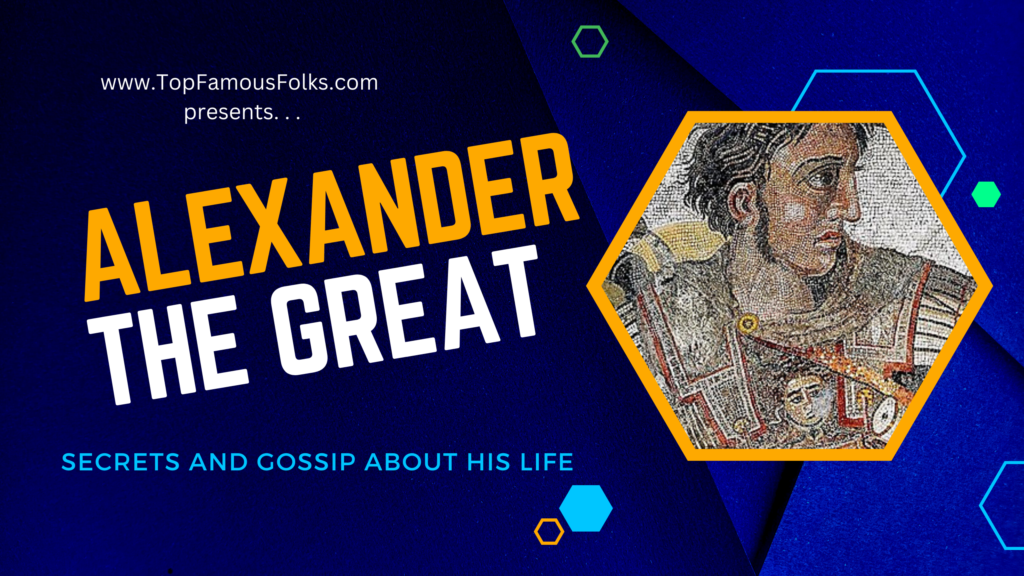
Our #1 pick for the top 10 list of famous generals / leaders of all time is Alexander the Great.
Alexander the Great – Early Life

Alexander the Great was born in July 356 BCE in the ancient city of Pella, the capital of the Kingdom of Macedonia. He was the son of King Philip II of Macedon and Queen Olympia, daughter of King Neoptolemus. From an early age, Alexander showed a love of learning and a thirst for adventure. He was tutored by Aristotle, one of the greatest philosophers of the ancient world, and developed a love of literature, science, and the arts.
Alexander was raised in a world of military power, and his father was one of the most successful military leaders of his time. King Philip II expanded the territory of Macedonia, creating a powerful kingdom that extended from Greece to the Balkans. Alexander grew up in this environment, learning about the art of war and the importance of strategy. He also developed a close relationship with his father, who instilled in him a love of conquest and a drive to succeed.
Alexander’s education was not limited to military strategy. He was also trained in the art of diplomacy, and was taught how to negotiate with other leaders. He learned about the history of the ancient world, studying the great civilizations of Greece, Persia, and Egypt. He also developed a love of horses, and was known for his skill as a horseman.
Alexander’s early life was marked by conflict, as he grew up in a time of political unrest in Macedonia. His father’s attempts to expand the kingdom led to opposition from rival states, and Alexander was often called upon to act as a mediator in these disputes. He was also involved in several military campaigns, serving as a commander and honing his skills as a leader.
In 336 BCE, King Philip II was assassinated, and Alexander became the king of Macedonia at the young age of 20. He was faced with the challenge of consolidating his power and maintaining control over the kingdom. Despite these challenges, Alexander was determined to continue his father’s work and expand the territory of Macedonia. He quickly launched several successful military campaigns, and his victories brought him fame and prestige.
Major Accomplishments of Alexander the Great
Alexander the Great was a visionary conqueror who left an indelible mark on the ancient world. In a mere 13 years, he conquered most of the known world, creating an empire that extended from Greece to India. His military prowess, strategic brilliance, and diplomatic skills made him one of the greatest leaders in history.
Alexander’s major accomplishments began with his conquest of the Persian Empire. He defeated the Persian army in several key battles, and his victories brought him control over much of the Persian Empire. Alexander was able to maintain control over his newly conquered territories, and he implemented a series of reforms to bring about stability and prosperity. He encouraged the spread of Greek culture throughout the empire, and he founded several cities, including Alexandria in Egypt, which became one of the greatest cities of the ancient world.
Alexander’s military conquests extended beyond the Persian Empire, and he continued to expand his territory, marching his army as far east as India. He encountered resistance from the Indian army, but his tactics and strategy were unmatched, and he was able to defeat the Indian forces in several key battles. He brought an end to the powerful Indian kingdoms and added their territories to his empire.
Alexander’s military prowess was matched by his diplomatic skills. He was known for his ability to negotiate with other leaders, and he was interested in the cultures of the places he conquered. He encouraged the spread of Greek culture throughout the world, and he was known for his tolerance of other cultures. He was also a visionary, and he saw the potential for a world united under one rule, with a shared culture and language.
Alexander’s legacy extends beyond his military conquests and diplomatic skills. He was a visionary who saw the potential for a united world, and he left a lasting impact on the ancient world. His conquests created a bridge between the East and the West, connecting the ancient civilizations of Greece, Persia, and India. He was also a patron of the arts, and his love of literature and science had a lasting impact on the cultural and intellectual development of the ancient world.
Alexander’s major accomplishments were not limited to his military conquests and diplomatic skills. He was a brilliant military leader and a visionary who left a lasting impact on the world. Whether you admire him as a military strategist, a visionary, or simply a fascinating historical figure, Alexander’s life remains one of the most captivating and enduring stories of all time. His legacy lives on as one of the greatest conquerors of all time, and his story continues to inspire and captivate people around the world.
Last Days of Alexander the Great
Alexander the Great was one of the most remarkable figures of the ancient world, but his later life and death remain shrouded in mystery. Despite his many accomplishments and his impact on the world, the last few years of his life are a subject of much speculation and debate among historians.
After his conquest of India, Alexander returned to his empire, where he faced several challenges. He was faced with the task of consolidating his empire, and he struggled to find a suitable heir to take over when he died. He was also faced with a series of rebellions, and his once-loyal army began to turn against him. Despite these challenges, Alexander remained a visionary and a brilliant military leader, and he continued to make plans for the future of his empire.
Alexander’s health began to decline, and he was plagued by a series of illnesses. He died in 323 BC, at the age of 32, in the city of Babylon. The cause of his death remains a subject of much speculation, and some historians have suggested that he may have been poisoned. Despite the many theories about his death, the exact cause remains unknown.
Alexander’s death marked the end of an era, and his empire was soon divided among his generals. The legacy of his conquests and his vision for a united world lived on, however, and his impact on the world continued to be felt for centuries to come. The city of Alexandria, which he founded in Egypt, became one of the great cities of the ancient world, and his conquests helped to spread Greek culture and ideas throughout the world.
Alexander’s death was a turning point in world history, and his legacy continues to inspire and captivate people around the world. He was a visionary, a brilliant military leader, and a fascinating historical figure, and his life remains one of the most captivating and enduring stories of all time. Whether you admire him as a conqueror, a visionary, or simply a fascinating historical figure, Alexander’s life and death continue to captivate and inspire people around the world.
In conclusion, Alexander the Great was one of the most remarkable figures of the ancient world, but his later life and death remain shrouded in mystery. Despite the many challenges he faced in his later years, he remained a visionary and a brilliant military leader, and he died in 323 BC at the age of 32. His death marked the end of an era, and his empire was soon divided among his generals, but his legacy lived on, and his impact on the world continued to be felt for centuries to come. His life remains one of the most captivating and enduring stories of all time, and his legacy continues to inspire and captivate people around the world.
